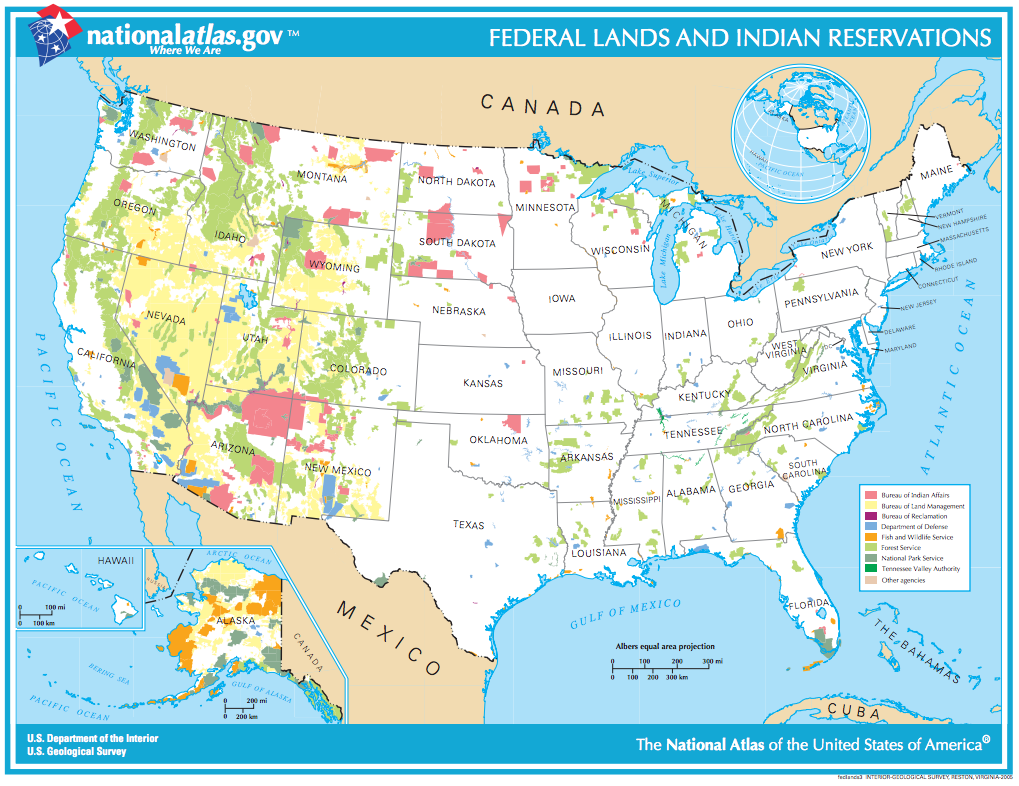Let States Manage Their Own Land; Don’t Reauthorize LWCF
A debate in Washington over the reauthorization of the Land & Water Conservation Fund (LWCF) has brought up the often overlooked topic of federal land management. Many Americans may not know just how much land the US government owns. The federal government owns roughly 643 million acres of surface lands, tens of millions acres more of subsurface lands and 1.76 billion acres in the outer continental shelf (OCS) off our coast. The combined roughly 2.46 billion acres is larger, by comparison, than the entire landmass of the United States. Despite these holdings, the LWCF has been a major program for the federal government to continue to buy private lands in the United States.
Created in 1964, the LWCF is a fund that empowers the federal government to purchase private lands to be annexed into growing federal land holdings. This is funded through offshore drilling fees and royalties, which then go into an account that is appropriated to various land programs every year. On October 1, 2015, the LWCF charter expired–and will remain expired unless Congress acts to reauthorize the LWCF.
The question is whether Congress should look to immediately reauthorize this program, or whether this program can stand to have some changes made to it–considering it’s 50 years old. One thing is very clear–there is no emergency facing the program. Currently the LWCF has over $20 billion in unappropriated funds, enough to last at least 60 years if the trend of $300 million in annual appropriations (the minimum amount) continues. Even though the charter has expired, the LWCF can continue to operate on annual appropriations. Thus, claims that the fund is in a crisis are simply untrue. The LWCF should not be reauthorized, at least until serious reforms regarding federal land acquisition are addressed.
At issue is the growing abuse of federal power used to annex state, local, and private land under the auspice of ‘conservation’ or ‘stewardship.’ Between the four major land owning agencies–the BLM, Forest Service, Fish and Wildlife Service, and the National Park Service–the federal government controls 643 million acres of land, roughly 29 percent of all acreage in the US. In a state like Utah, over 60 percent of the land is controlled by the federal government.
Since the federal government owns so much land that–unlike private lands–produces so little economic enterprise, states and localities are forced to rely on the federal government for revenues, called Payment in Lieu of Taxes (PILT). In 2015, Congress appropriated $405 million for PILT on over 607 million acres of land, the highest it has been in six years, and by a good margin: the next highest total year PILT was $360 million in 2010. A reauthorization of the LWCF could lead to even higher federal spending for PILT in the years to come, and thus greater state dependence on the federal government.
Further, the federal government does a poor job of administering land as opposed to states and localities. For example, over the past 5 fiscal years, oil production is up 89 percent in the U.S. on non-federal lands, while oil production is down 10 percent on federal lands. As explained by the Property and Environment Research Center, “States have clearly demonstrated their ability to generate greater returns from land management than the federal government.” According to their study, from 2009-2013 state lands totaled over $223 million in net revenue, while federal lands lost nearly $2 billion. If we care about land management, a reauthorization of LWCF in its current state is not the best remedy. States must have a greater role in land administration.
At the very least, the LWCF should be reformed prior to any talk of reauthorization being acted upon by Congress. Reform should include measures to give power back to states over lands within their own borders and allowing them to be stewards of their own land. After all, who knows better about the needs of local people and environments than those who live and work closest to them.
Some in Congress want to permanently reauthorize this program, but permanent reauthorization of programs sets a bad precedent. It also seems to indicate that there is something wrong with private land ownership, and that the federal government needs to buy more and more and more private land. Taxpayers are better served if programs are continually reviewed, evaluated, and then reauthorized–with appropriate changes in policy, if deemed prudent. This also forces Congress to prioritize in a way that they rarely do.
The LWCF, initially a bipartisan endeavor, strayed far from its initial goals and now serves as a tool for the federal government to pay for or seize land from states and individuals. States and localities are the best stewards of the beautiful land that we Americans call home, not the federal government. Congress should look to give states greater authority and power over their own lands and should not reauthorize the LWCF without first initiating substantial reforms.


Speak Your Mind